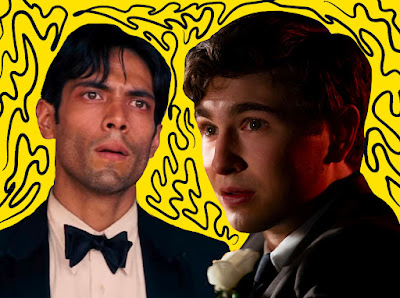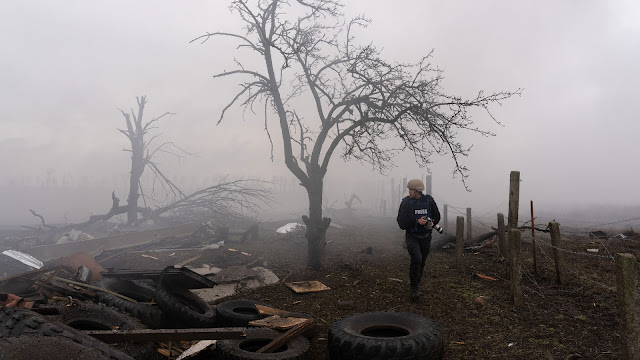As Dangerous as a Lion’s Mouth: The American Love Letter to Cinema in the 2020s
by Levi Homman
Hollywood loves Hollywood. In contemporary memory, Damien Chazelle’s La La Land and Quentin Tarantino’s Once Upon A Time… in Hollywood have been well-received, boasting a wide range of nominations and wins at awards shows, as well as a largely positive reception from audiences. These weren’t the first movies of their kind, either; Cinema Paradiso, Sunset Boulevard, The Artist, Singin’ in the Rain, and even more cynical looks at the industry like The Player and Mulholland Drive come to mind as key predecessors. This past year, we got a few more. Notably, Chazelle is back with Babylon, an explosively coarse expansion on La La Land, and 2022 also saw The Fabelmans, Steven Spielberg’s autobiography about his familial struggles and his love for the medium. Both have been divisive in their own respects, as well as struggling at the box office, but there’s something fascinating about how frequently these scripts get financed and the way this specific type of movie makes its way into the public consciousness time after time. It’s easy to write these films off as masturbatory and overindulgent, and at times they are, but there’s something healthy about the way they so closely examine themselves as well. Both Chazelle and Spielberg have an adoration for the art form, but what also comes across in their work is a sense of guilt; they know they’ve dedicated their lives to a historically schismatic practice. Unlike the endearing saccharinity that Old Hollywood coddles itself with in Singin’ in the Rain, there’s a sense of melancholy in both these films. They arrive at this tone from different perspectives, but the way they challenge the viewer and the craft as a whole is far more important and culturally impactful than many are willing to give them credit for. Babylon and The Fabelmans are much more complicated than their trailers want you to believe, and the way the so-called “love letter to the movies” has evolved is an invaluable part of film history that continually proves its necessity.
One of the first, most memorable scenes in Babylon is a maximally debauched party at a movie executive’s mansion. The owner of the home is a higher-up at Kinoscope, Chazelle’s stand-in for Paramount Pictures. Here, our two main characters Manuel “Manny” Torres (Diego Calva) and Nellie LaRoy (Margot Robbie) meet for the first time. The two bond over cocaine and a shared dream of being “part of something bigger”. At this party, we also meet a whole host of the ensemble, including, but not limited to Black jazz musician Sidney Palmer (Jovan Adepo), and silent film star Jack Conrad (Brad Pitt). These character introductions are interspersed between scenes of public intercourse, pedophilic urolagnia, and the violent entrance of a live elephant that tramples partygoers. It’s clear from the get-go that Chazelle has a love-hate relationship with it all. The industry is disgusting and exploitative, but Manny and Nellie, the aspirational, relatable underdogs care enough about making art that they want to dive in anyway. The three-hour chronicle that follows the party closely, and clearly intentionally, parallels the plot of Singin’ in the Rain. The characters struggle to transition from silent films to talkies, and eventually the world leaves them behind. Manny and Nellie make their way up at Kinoscope, Manny as a director and producer and Nellie as an actress, but Nellie’s gambling addiction and substance abuse eventually force them to flee Los Angeles. Sidney cuts a profitable deal with Kinoscope, but steps away when producers force him to wear skin-darkening makeup to avoid race-mixing allegations in his band. Jack, losing relevance, eventually commits suicide. All of these characters, the good-hearted creatives, are constantly conflicted as they abuse themselves and others. Up until the film’s final moments, it indicts Hollywood far more than it praises.
But after the story’s logical conclusion, with Manny and Nellie going their separate ways, we see Manny return to the Paramount arches (or in this case, the Kinoscope arches) with his new wife and child. While visiting LA, he also happens upon a showing of Singin’ in The Rain, the film that Chazelle has been so blatantly mimicking. He sees the history he lived in the film; Jack says “I love you” just like Gene Kelly in one particular scene, Nellie works with her diction coach nearly identically to Jean Hagen’s character. This evokes an emotional response from Manny. He laments the squeaky-clean revisionism, but he loves the silver screen all the same (much like Chazelle himself, and, he hopes, the audience). As Manny begins to cry, we see a montage of cinema’s greatest hits, from the earliest silent films to recent blockbusters like Avatar. It’s some tediously redundant messaging, but Chazelle’s core ideas come across well; he loves the art of moviemaking, is deeply uncomfortable with the industry’s practices, but keeps at it all the same, aspiring for greatness despite his moral qualms. This is the plight of many an artist, but perhaps is most common in Hollywood, a field wrought with bigoted history and #MeToo horror stories. It’s strange, because the marketing for Babylon would suggest it’s more of a tribute to Singin’ in the Rain’ than a direct response, but it's Chazelle's repeated and self-aware contradiction of himself that makes the film worthwhile and significant.
The Fabelmans balances itself on a similar, but not superfluous contradiction. Rather than write a surrogate of himself at a long-lost place in film history, Spielberg instead draws directly from his own life, using the young Sammy Fabelman to explore his own memory. The film is about more than just the movies; it’s also a coming-of-age story about Spielberg’s struggle with his parents’ divorce and the lies we tell to keep the peace. Some of those larger core themes are enough to set The Fabelmans apart from the usual mawkish odes that it may resemble, but what makes it especially compelling is that it addresses those ideas through the self-awareness of Sammy’s camera lens, and ultimately, similarly to Babylon, uses the emotional plot threads to challenge why we make films in the first place.
Sammy first gets his introduction to film when his parents (Michelle Williams and Paul Dano) take him to see Cecil B. Demille’s The Greatest Show on Earth as a young child (Mateo Zoryan portrays this younger version of the character). What a first-time viewer might expect from this moment in the film is a spark of inspiration for Spielberg’s childhood mind; this seems like a classic opportunity to demonstrate how awe-inspiring and beautiful he finds filmmaking. But Sammy doesn’t like the movie. In fact, it scares him so badly that he can’t sleep that night, and finds himself caught up in the dread and fear that it struck in him. It’s that fear, though, that would keep a hold on Spielberg for the rest of his life. The Greatest Show leads him to filming his own model trains, crashing them over and over in order to shoot and edit them into something that resembles Demille’s work. From that point on it becomes an unhealthy obsession for Sammy, who, as a teenager (Gabriel Labelle portrays the older iteration), begins to prioritize his own filmmaking process over familial obligations, even in the wake of his grandmother’s death. He’s given a lecture when his uncle Boris (Judd Hirsch), who worked as a circus and film performer, comes to visit. “[Art] will tear your heart out and leave you lonely” Boris says, “You’ll be a shonda for your loved ones. An exile in the desert.” This moment is, if only for a moment, a distillation of Spielberg’s thesis. It’s a more personal angle than Chazelle’s, but he arrives at the same conclusion: pursuing filmmaking as an art form is, in many ways, a selfish act, but there’s something frustratingly and unmistakably beautiful about it despite that.
These words of warning from Boris clearly resonate with Sammy, leading him to forgo a larger passion project to edit a home movie of a family camping trip at his father’s request. Through editing the film, he discovers evidence of his mother’s affair with family friend Bennie (Seth Rogen), shattering his worldview and creating a stronger resentment for the medium of celluloid that he feels so drawn to. The second and only other time Spielberg explicitly narrates his deeper, more opposed feelings about filmmaking is when his parents, on the verge of separation, begin arguing in the foyer of their home with Sammy and his siblings as an audience. Sammy watches quietly from the stairs, briefly imagining himself filming the moment for a movie. Disgusted with himself, he retreats upstairs to his room. It’s these transient moments that hang over the entire narrative, and not only incriminate film as a concept, but also Spielberg himself, who dramatizes and simplifies his own life in a way that he clearly makes him feel a sense of culpability. Again, like Babylon, the promotional material for The Fabelmans feels far more surface-level and cloying than what the film actually achieves, and what Spielberg does realize is, from a storytelling perspective, rewarding and surprisingly unconventional.
There’s no shame in revisiting Singin’ in the Rain and movies like it from time to time. For cinephiles, they tap into a childlike nostalgia that pats us on the back for immersing ourselves in the escapism of motion pictures and reflects the real value they have for artists and the culture at large. But these newer, so-called “love letters” aren’t in the same category, not really. There are a number of other recent films that could be defined similarly, and reach varying levels of success at what they attempt: Empire of Light is, apparently, as sickly sweet as it appears, and Nope reaches new conceptual heights with a far less traditional narrative structure in the horror genre. There are few, though, that attempt the passionately distraught artistry that Babylon and The Fabelmans do. Neither are perfect, and they unpack their ideas on different terms, but they address an anxiety specific to American filmmakers that is simultaneously upsetting, tragic, and joyously sympathetic. Chazelle explores the darker side of the industry in Babylon and Spielberg explores the darker side of his personal experience as an artist in The Fabelmans. Neither are excessively complimentary of Hollywood, nor are they wholehearted imputations of the industry, and that’s what makes them uniquely fascinating and what will likely allow them to endure long past their release; only artists unnaturally obsessed with filmmaking could make them. It’s important for the industry, and the culture of film as a whole, to be able to reflect on its own flaws. There is a place and a time for sugar-coated reminiscence as much as confrontational metanarratives. The “love letter to the movies” is alive and well, and when you compare Babylon and The Fabelmans to what preceded them, it’s exciting to consider what the next generation of filmmakers will create when they inevitably encounter the same dilemmas.
You can find Levi on Letterboxd or on his film review blog, Levi on Film!



Comments
Post a Comment